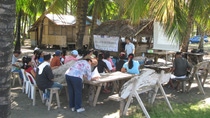Sustainability
Sustainable coconut farming is transforming lives

Most of the world’s coconuts are grown in small, independent farms in the Philippines and Indonesia. The majority of coconut farmers are smallholders and tenants cultivating less than four hectares (about the same size as four sports pitches), in poor rural areas. This gives rise to multiple challenges: little or no economies of scale, lack of financing or training, and a rigid supply chain often dependent on middlemen. Farmers have few options to improve their livelihoods.
BASF invests in order to address these challenges and helping smallholder farmers to improve their livelihood through supporting a sustainable certified coconut oil supply chain. Together with its partners Cargill, Procter & Gamble (P&G), the Deutsche Gesellschaft für Internationale Zusammenarbeit (GIZ) GmbH and with the strong support of Rainforest Alliance and Philippine Coconut Authority, BASF supports the physical transformation of the markets towards sustainable supply chains and is committed to further promote the production of certified sustainable coconut oil.
Smallholder coconut farmers take part in trainings designed to increase the productivity of their farms – and with it, their incomes and economic self-sufficiency. The training on Good Agricultural Practices includes the right use of fertilizers, the principles of intercropping and replanting to improve long-term yields. Participants also learn farm management skills. Those who master these skills can then apply for further certification.
Cargill, which owns and operates copra-buying stations and crushing plants, is providing training to smallholder farmers and setting up the structures for certification. The crude and refined oil produced by Cargill is then further processed by BASF and P&G for ingredients in the home and personal care and in the nutrition and health markets.
Around 3,300 smallholder coconut farmers in the Philippines and Indonesia will benefit from the program, with around 800 farmers receiving additional training on the Sustainable Agricultural Network (SAN) standards in order to apply for Rainforest Alliance certification. Three hundred farmers have already achieved certification and produced the world’s first Rainforest Alliance CertifiedTM copra. Certified produce can command higher prices, providing farmers with a higher, more consistent income. The extra income has already started to transform lives of the coconut farmers.
“Through certification I earned additional income from premiums,” said Natividad Beligolo, a coconut farmer from Sarangani Province in the Philippines who completed the training and certification, “This is a big help to our family to sustain our everyday lives – more food on the plate and ensuring education to our children.”
Certification and improved supply chain transparency are crucial steps towards making coconut production more sustainable and responsible. This is increasingly important to manufacturers of health, personal and home care products.
“Collaboration and partnership have been stand-out features of this initiative. From smallholder farmers to large multi-nationals, including the public sector and standard setting organizations, everyone is dedicated to working together,” said Ina Boos, Sustainable Coconut Oil Project Manager at BASF. “We are showing that it is possible to specifically promote the production of sustainable certified coconut oil and help improve the living conditions of coconut farmers. BASF is proud to be a partner of this initiative. We know this is just the beginning of a journey, but the success of this project allows everyone involved to look to the future with optimism."